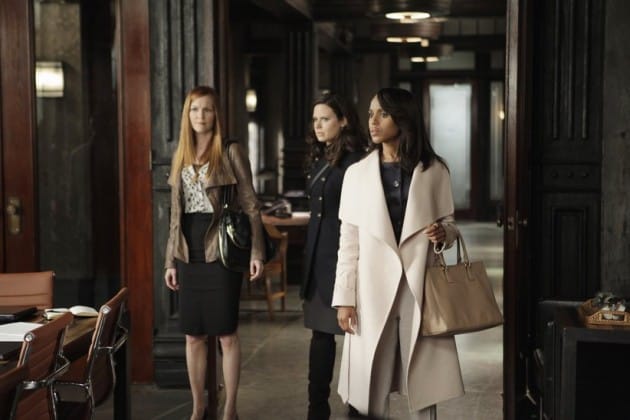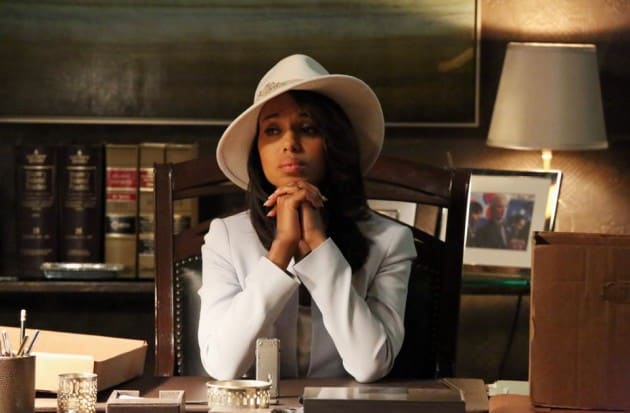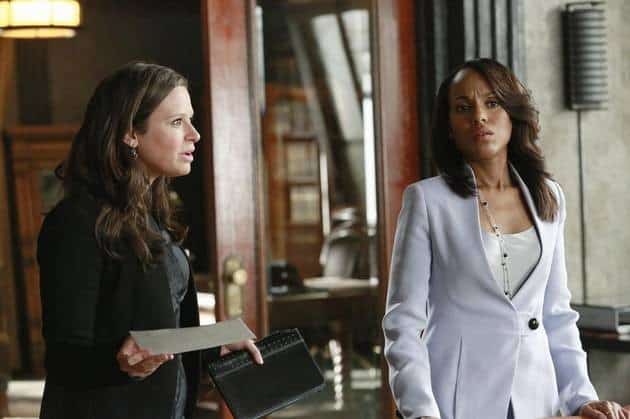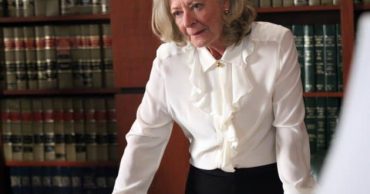
Strong female heroines with complex and often traumatic pasts are part of Shondaland’s DNA. Therefore, it comes as no surprise that the women of Scandal exhibit deep scars and overwhelming power in equal measure. Out of the regular characters of the engrossing ABC drama, all four women have endured harrowing experiences. Simply put, Olivia, Abby, Quinn and Mellie are a maternal orphan, a wrongly accused woman, a victim of domestic violence, and a rape survivor, respectively. Nonetheless, where the narrative of Scandal excels is not only at exposing the aforementioned wounds from the past but also at making the group of women as strong and powerful as they can be, in spite of the perpetual grief they are condemned to live with. Scandal does not reduce their characters to the “victim” label, nor does it fall for the trappings of condescension, which is not a small triumph. At no point are the women are treated as “damaged goods.” To the contrary, the show is an ode to resilience; in times where certain conversations need a consistent volume and stand, Scandal, provides them.
Lets take a look at each character.

Olivia Pope (Kerry Washington)
From the early stages of Scandal, the audience gets the sense that Olivia does not have a strong relationship with her family. As the type-A personality she is, the crisis manager has her close-knit team, her gladiators, and her job. Family portraits don’t make the cut and seem to be obliterated by pictures of clients, victims, and suspects, instead. Olivia has persons of interest, but, unlike Shondaland’s Meredith Grey, she doesn’t have “HER person.” As it happens, Olivia is the foster parent of her cases, while her gang of misfits are strays she has brought together.
As Scandal develops and Pope’s backstory begins to move to the front, it is revealed that Olivia’s mother, Maya Lewis (played by the uber-talented Khandi Alexander) died while on Flight 522 to London. The plane crash was believed to be caused by an engine problem. Olivia was twelve at the time. In parallel, it is disclosed that the crisis manager’s father Eli/Rowan Pope (impeccably played by Joe Morton) was somewhat of a deadbeat.
The family dynamic plot has had numerous twists and turns, and quality jaw droppers in the mix; the truth has been relatively flexible and, above all, painful. Notwithstanding, the fact is that Olivia was indeed brought up as a maternal orphan. Her mother actually having had a heart beat all along in no way alters the trauma Olivia endured by growing up without her. Associated with this maternal void, Olivia showcases most of the characteristics that grown ups who lost one or both parents usually present. In spite of that, the character is not regarded as pitiful. There have been heartbreaking moments on Scandal where Olivia has faced mommy and daddy dearest, and she has always held her own, while keeping the audience on her side, not just because people feel sympathetic towards someone who has been hurt, but mostly, because the character is a fighter. One everyone wants to win.
By the way Scandal has been fleshed out, there has not been any patronizing by having Olivia as a virtual orphan. Moreover, she is not the stereotypical orphan, which is refreshing, to say the least. That said, and taking into consideration how many famous super heroes were orphaned (Superman, Batman, Spider-Man, Robin, The Flash, Captain Marvel, Captain America, to name a few), having a woman joining that list, is no small detail. At the same time, even Olivia’s own type of “superpowers” can’t resurrect the family she lost by age 12.
Abby Whelan (Darby Stanchfield)
Abby is not only Olivia’s best friend, and sometimes acting conscience, but for the most part, and up until recent developments, she was also a fundamental member of Olivia Pope & Associates (OPA). Darby Stanchfield is simply fantastic as Abby, and the writers have done a terrific job at composing the character. The same way that Olivia is not instantly associated with the term “orphan,” Abby is not defined by her past as a battered woman.
It is known that Abby had been married to Charles Putney (Michael Trucco), whom she left, after, in a drunken stupor, Putney beat her up, breaking bones and all, to then throw her out into the snow. Immediately, Abby reached out to Olivia, who provided a superb divorce attorney and a tire iron hit to Charles’ knee cap. Then she gave Abby shelter in her apartment and ultimately took her friend under her wing. As a result, thanks to having a new purpose, Abby not only healed and grew; she eventually ended up working for none other than the President at the White House.
As stated previously, at first glance, Abby does not scream “wife beater survivor.” Why? Because as a culture, we are extremely accustomed to seeing spousal abuse victims as weak and broken, filled with excuses, sad stories, bruises and little goals if at all. Once again, Scandal does a tremendous job acting as a catalyst to a series of facts. For starters, showcasing a survivor first and exposing the wounds later on affects and inflects the perception of the character, causing a shift in the common paradigm that TV uses so much. By having a strong, bright woman, who is able to get a second chance at happiness and succeeding at it, in spite of the distressing experiences her marriage and her ex husband provided, Scandal also makes additional good remarks. In my opinion, the most important ones that Scandal presents us with are that abuse does not discriminate–it can take place within any and all socioeconomic classes–and, most importantly, that there is hope.
Quinn Perkins (Katie Lowes)
Jean Paul Sarte claimed that “Freedom is what we do with what is done to us.” He was right. Now Quinn, formerly Lindsay Dwayer, would perfectly embody freedom, after being somewhat of a fugitive of the law, since, she is what she did with what was done to her. When she was still Lindsay, Quinn lived in California with her boyfriend, Jesse Tyler (Adam Shapiro), who worked for Cytron and was one of the people who helped President Grant get elected, via not very legal actions. Tyler and six other Cytron employees were murdered in an explosion, that Lindsay, a.k.a. Quinn, was framed for and suspected of causing. However, per Olivia’s request, Huck (the intense Guillermo Diaz) drugged and kidnapped Quinn and left her in a hotel, along with documentations to validate her Quinn Perkins identity. When she woke up, she decided to play along. Later on, she would be offered a job at OPA, she would lose yet another boyfriend to murder, and her real identity would be discovered. After a trial took place and Olivia asked for a favor from her mentor, Verna Thornton (Debra Mooney), Quinn was exonerated. Once the truth of who she really was came to light, Quinn made the choice to BE Quinn, to stay with OPA, and to be Huck’s disciple of sorts.
Quinn is a character that has suffered different kinds of traumas. Between the initial identity loss, to being wrongly accused, to witnessing a death, to later on being tortured by none other than Huck, there seems to be a pattern in which blood brings a new aspect of her own self-hood to the surface. The more hits Quinn takes, the more she gets to know herself and her own strength, while the audience gets to observe multiple incarnations. That doesn’t necessarily take away from the pain she has experienced, although it does add up to the notion that the character is practically invincible. Once again, the Quinn persona is not treated as weak; she is not a poor little girl who ran, a victim of the system, or a woman who has the tendency to date men with targets on their backs. In the same manner, she is not portrayed as someone who was tortured and hid. Instead, she fought back and confronted each and every of her demons. She is a free woman who has dealt with every single crisis that has been thrown at her and has come through the other side. Once again, Quinn serves as a perfect vessel of perseverance in a show that keeps making good points when it comes to women and their own power.

Mellie Grant (Bellamy Young)
Mellie is, without a doubt, one of the Scandal characters whose perception has been redefined the most. In the beginning, she appeared to be a cold, scorned woman, betrayed and with few options; however, it did not take long for layers to present themselves, uncovering the many complexities of this fictional First Lady. In the same manner as how the other female characters cannot simply be defined by the trials or tribulations they have stumbled with, Mellie is yet another tour de force with a terrible scar. She was raped by her father in law, Jerry Grant (Barry Bostwick), and kept the sexual assault in the dark. However, she pressured her rapist to be supportive of her husband, Fitz Grant (the sublime, Tony Goldwyn) in hopes that would give him the necessary boost to up his game as a politician. Afterwards, Mellie learned she was pregnant and was unsure of the paternity of her unborn child. Eventually, it would be disclosed that Jerry Jr. was a consequence of the criminal attack she was subjected to, at the hands of her husband and son’s biological father.
In many ways, the manner in which Mellie’s rape was illustrated did make her “more human” to the audience, since it explained many of the walls the First Lady had built up and also why she might have resented her own husband, even if he was not to blame. Experts on the subject almost unanimously claim that every sexual assault survivor, at one point or another, unconsciously reproach those who they think could have saved or protected them. That said, Mellie Grant is an intelligent and powerful woman who has succeeded in life, too. Rape is not all you read in her eyes. Rape is not who she is. This, too, is another point scored for Scandal and how the series tackles sensitive issues, not with a patronizing blanket but with a more positive attitude. Scandal reinforces the notion that women who were powerless at one point of their lives can survive and reclaim not only their rights, but also their identities. That is, in my opinion, one of the strongest messages the show irradiates, and it’s empowering.
The fact that the character, in a way, blackmailed her assailant, has been polarizing among viewers; however, I believe it is very relevant to bring up a few notions. For instance, blackmail doesn’t make Jerry Grant less of a rapist, nor does that make Mellie unresponsive or cold to the violation he perpetrated towards her integrity, her body, and her emotional being. Secondly, rape survivors protect themselves in the best way they can. They’ve been as vulnerable as one can be, therefore, actions are necessary. Mellie took action the best way she knew how. Rape is not a lemon she could make lemonade out of. There’s no byproduct of rape that qualifies as “worthy,” just a best case scenario out of a fatal act. Moreover, it is interesting that Shonda Rhimes and Co. chose this very character to be a rape survivor, as having Mellie going through what she did, there is traction to the notion that if something as brutal as sexual assault can happen to a First Lady, it can happen to anyone. The way the act takes place in the show is a good example that sheds some light on the fact that rape occurs because rapists exist. The end. In the scene of the attack, it can be seen clearly that there is no miscommunication.
To add misfortune and tragedy to Mellie’s already traumatic history, she has also loses her son, Jerry Jr., which, once more, acts as a reminder that not even the most privileged of social statuses can do much when it comes to pain and loss. Regarding this particular narrative choice made by the writers, all I can do is repeat what I’ve been stating all along: there was zero condescension. What will always be a serious matter and source of misery was tackled with a fair dose of reality and dignity, and despite the obvious everlasting lingering agony that the characters will show as a consequence to Jerry’s death, more strength will always surface.

Scandal is a show that targets woman. It is also a series that is widely enjoyed by its audience, which is mostly comforted by individuals of the female gender. One of the many reasons this happens (and you can read others here) is that topics that are intimately linked to women (and in my opinion should be to men as well) are being treated with the utmost respect and tact. Yes, the female characters all have gone through unmeasurable levels of pain, and certainly, they are flawed. However, they are also strong, and surviving the things each and every single one of them did is not something that come easy to any persoon. The traumas those characters had to deal with are the kind that change a person for ever, but Olivia, Abby, Quinn, and Mellie, are not finished, defined, or dulled. What didn’t emotionally kill them did, in fact, make them stronger. That said, it is a pleasure to witness the manner in which the characters were fleshed out, not exploited. Even though, the horror doesn’t dilute, they still win as survivors by leading fabulous lives.
When writing a character, the temptation is always there, to touch a scar just to elevate the action-reaction formula and pave a highway to conflict. Nonetheless, that operation is usually a sign of desperation that often signals that plots are drying up. That is not the case for Scandal dramatically. The backstories described, and how they operate as a centrifugal force, work. The narrative is also thicker because of the pasts these female characters have. And that’s key. They are not just pained women. Their traumas are part of them, and still beneath the people they have become. By vindicating the stands women can take, even after having gone through hell and back, Scandal has not simply contributed to the conversation; it has provided a safe environment in which the conversation can take place.
[Photos via ABC]
 Follow Us
Follow Us







